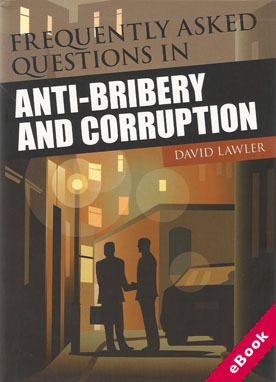
The device(s) you use to access the eBook content must be authorized with an Adobe ID before you download the product otherwise it will fail to register correctly.
For further information see https://www.wildy.com/ebook-formats
Once the order is confirmed an automated e-mail will be sent to you to allow you to download the eBook.
All eBooks are supplied firm sale and cannot be returned. If you believe there is a fault with your eBook then contact us on ebooks@wildy.com and we will help in resolving the issue. This does not affect your statutory rights.
For many years, companies did not have to concern themselves with bribery; it simply wasn’t on the radar. Indeed, in many jurisdictions, companies could get tax relief on bribes paid to get business. The Us Foreign Corrupt Practices Act had been enacted in 1977, bit it was seldom enforced.
Today, we are in a changed business environment. Most countries have either adopted the OECD anti–bribery guidelines or enacted their own. Multinationals are being aggressively targeted and prosecuted, and companied are facing penalties and remediation costs of hundreds of millions of pounds. Some executives are even serving time in prison.
In the UK, the Bribery Act 2010, which came into force in July 2011, represents the new ‘gold standard’ against which companies’ anti–bribery programs will be judged. Comprehensive and anti–bribery programs must now be in place, and be complied with in all businesses–especially those operating overseas.
Frequently Asked Questions in Anti–Bribery and Corruption is a practical, jargon–free guide to implementing, communicating and testing controls and procedures that comply with, and exceed the standard required under the laws. It also provides advice on the most effective reaction to allegations of bribery if and when they occur. It includes:-